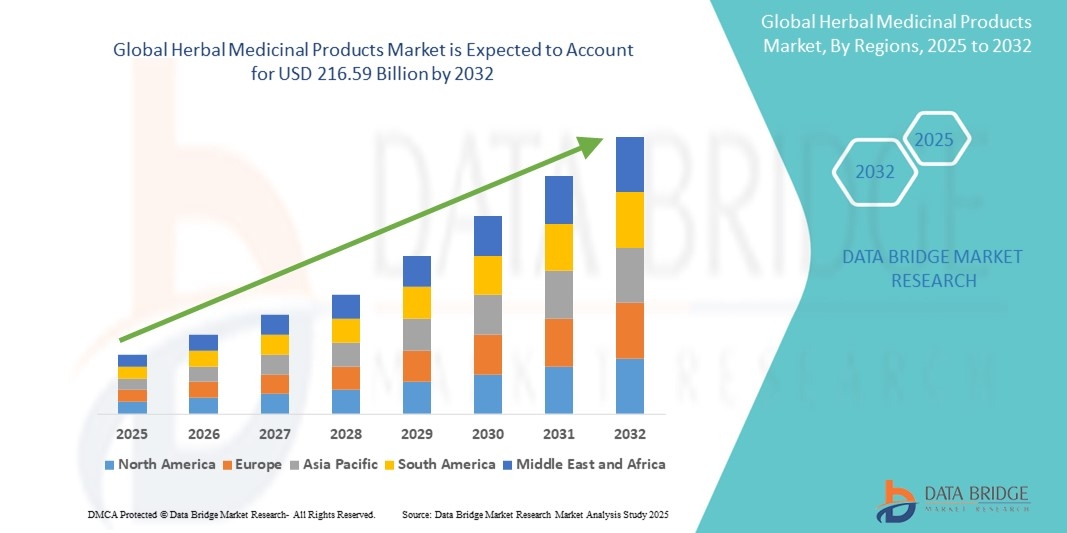How is the shift toward natural wellness boosting the herbal medicinal products market?

Introduction
The Herbal Medicinal Products Market encompasses natural products derived from plants, herbs, and botanicals, used for therapeutic, preventive, and wellness purposes. Herbal medicines have been a part of traditional healthcare systems for centuries, offering treatments for a wide range of conditions, including digestive disorders, respiratory ailments, stress, and chronic diseases. Their significance lies in providing natural, often safer alternatives to synthetic drugs, attracting consumers worldwide who prefer holistic and sustainable healthcare solutions.
In recent years, the market has witnessed substantial growth due to rising awareness of herbal remedies, increasing prevalence of lifestyle diseases, and a global shift toward natural and preventive healthcare. Herbal medicinal products not only support individual health but also contribute significantly to the pharmaceutical and nutraceutical industries, bolstering the global economy. With the growing adoption of herbal supplements, extracts, and formulations, this market continues to expand rapidly across regions.
Stay ahead with crucial trends and expert analysis in the latest Herbal Medicinal Products Market report. Download now: https://www.databridgemarketresearch.com/reports/global-herbal-medicinal-products-market
Market Overview
The Herbal Medicinal Products Market has shown steady expansion over the past decade, driven by rising consumer interest in natural health solutions and growing investment in research and development. Asia-Pacific, home to traditional medicine systems such as Ayurveda, Traditional Chinese Medicine, and Unani, represents the largest market, followed by North America and Europe. The increasing popularity of herbal products in Western countries is fueled by awareness of their benefits, changing consumer preferences, and demand for alternative therapies.
Market size is expected to grow consistently, supported by innovations in product formulations, improved extraction techniques, and rising availability of standardized herbal supplements. The integration of herbal medicines into mainstream healthcare and wellness routines enhances their adoption across demographics. E-commerce and online retail channels also play a crucial role in expanding accessibility and visibility of herbal products to global consumers.
Key Market Drivers
Several key factors are driving the Herbal Medicinal Products Market:
-
Growing Consumer Awareness: Consumers are increasingly informed about the benefits of herbal products, natural remedies, and preventive healthcare, leading to higher adoption rates.
-
Rising Prevalence of Chronic Diseases: Conditions such as diabetes, cardiovascular disorders, stress, and obesity have fueled the demand for herbal supplements that support health and wellness.
-
Technological Advancements: Improved extraction techniques, formulation methods, and standardization of herbal products ensure higher efficacy, safety, and quality, encouraging market growth.
-
Government Policies and Support: Regulatory frameworks promoting herbal medicine research and approval of herbal supplements in several countries facilitate market expansion.
-
Increasing Preference for Natural and Organic Products: Consumers seeking sustainable, chemical-free, and holistic health solutions are driving demand for herbal medicinal products globally.
Case studies demonstrate that herbal products, such as ashwagandha, turmeric extracts, and ginkgo biloba supplements, have experienced surging popularity due to clinical validation and increasing media coverage of their health benefits.
Market Segmentation
The Herbal Medicinal Products Market can be segmented by type, application, end-user, and region.
By Type:
The market includes herbal supplements, herbal extracts, herbal teas, essential oils, and topical herbal formulations. Herbal supplements, including capsules and tablets, dominate due to convenience and effectiveness. Herbal extracts and teas are popular for preventive healthcare and wellness purposes, while essential oils are widely used in aromatherapy and personal care.
By Application:
Applications include digestive health, respiratory health, cardiovascular health, immune support, stress management, and skin care. Digestive and immune health products lead the market, while stress management and beauty-oriented applications are experiencing rapid growth.
By End-User:
End-users comprise healthcare providers, wellness centers, retail consumers, and e-commerce customers. Retail consumers account for the largest share due to increasing self-medication and preventive health practices. Wellness centers and healthcare providers increasingly integrate herbal solutions into treatments.
By Region:
Asia-Pacific dominates due to traditional medicine practices and strong local production. North America and Europe are witnessing steady growth due to rising health consciousness, organic product trends, and supportive regulatory policies. Latin America and the Middle East & Africa represent emerging markets with increasing consumer interest in herbal therapies.
Competitive Landscape
The Herbal Medicinal Products Market is highly competitive, with key global and regional players striving for innovation, product differentiation, and market share. Leading companies invest in research to develop high-quality, standardized herbal formulations. Strategies include product launches, partnerships with traditional medicine institutes, mergers, acquisitions, and expansion into emerging markets.
Competition drives innovation in product variety, efficacy, and delivery formats. Companies emphasize transparency in sourcing, organic certification, and clinical validation to attract health-conscious consumers. Digital marketing, social media campaigns, and e-commerce integration enhance visibility and customer engagement.
Challenges and Restraints
Despite growth, the market faces several challenges. Standardization and quality control of herbal products remain significant hurdles due to variations in raw material sourcing and preparation techniques. Regulatory compliance varies across regions, which may slow market entry and product approvals.
High production costs for premium, certified, and clinically validated herbal products can limit affordability in certain markets. Additionally, the perception that herbal products are less effective than conventional medicines in some segments may restrain adoption. Supply chain disruptions for raw botanicals and seasonal variations in herb availability can also affect production.
Future Outlook
The Herbal Medicinal Products Market is poised for strong growth, driven by increasing consumer preference for natural health solutions, rising chronic disease awareness, and technological advancements in product development. Innovations in standardized extracts, bioavailability enhancement, and functional formulations will expand market opportunities.
Emerging applications in personalized nutrition, immune health, and preventive medicine are expected to boost adoption. E-commerce platforms and subscription-based delivery models will enhance accessibility and global reach. Additionally, collaborations between traditional medicine experts and pharmaceutical companies will foster product innovation and credibility.
Sustainability, organic sourcing, and eco-friendly packaging are likely to influence future market trends. With growing awareness and supportive policies, the market is expected to maintain a forward-looking trajectory, offering significant opportunities for manufacturers and consumers alike.
Conclusion
The Herbal Medicinal Products Market is a dynamic and rapidly growing sector, offering natural, effective, and preventive health solutions. Its expansion is driven by consumer awareness, technological advancements, and integration into mainstream healthcare. With continued innovation, increasing adoption, and supportive regulations, the market is set for sustainable growth and long-term potential.
Despite challenges such as standardization, regulatory hurdles, and supply constraints, the market’s outlook remains positive. Companies focusing on high-quality, clinically validated, and consumer-friendly herbal products are likely to succeed in capturing market share and driving innovation in the global herbal medicine industry.
Frequently Asked Questions (FAQs)
What is the growth rate of the Herbal Medicinal Products Market?
The market is growing steadily, driven by increasing demand for natural and preventive healthcare solutions worldwide.
Which region is expected to dominate the Herbal Medicinal Products Market in the future?
Asia-Pacific is expected to continue leading the market due to traditional medicine practices, local production, and high consumer adoption.
Who are the leading players in the Herbal Medicinal Products Market?
Leading players include global pharmaceutical companies, specialized herbal product manufacturers, and regional herbal medicine producers focusing on quality, innovation, and standardized formulations.
What are the major challenges faced by the Herbal Medicinal Products Market?
Challenges include standardization and quality control, regulatory compliance, raw material supply issues, and competition from conventional medicines.
What are the future opportunities in the Herbal Medicinal Products Market?
Opportunities include functional formulations, personalized nutrition, preventive health applications, e-commerce expansion, and sustainable and organic product offerings.
Browse More Reports:
Global High Barrier Packaging Films Market
Global Icing Sugar Market
Global Kids Travel Bags Market
Global Natural Gas Engine Market
Global Oil and Gas Pipes Market
Global Organic Sesame Seed Market
Global Osteogenesis Imperfecta Treatment Market
Global Polymer Microinjection Molding Market
Global Polyurethane Foam Market
Global Protein Beverages Market
Global Real Estate Software for Builders and Real Estate Agents Market
Global Residual Current Circuit Breaker Market
Global Rheology Modifiers Market
Global Rice Protein Market
Global Self Cleaning Filters Market
Global Shale Gas Market
Global Specialty Feed Additives Market
Global Tank Level Monitoring System Market
Global Tracheostomy Products Market
Global Uninterruptible Power Supply (UPS) Datacenter Power Market
About Data Bridge Market Research:
An absolute way to forecast what the future holds is to comprehend the trend today!
Data Bridge Market Research set forth itself as an unconventional and neoteric market research and consulting firm with an unparalleled level of resilience and integrated approaches. We are determined to unearth the best market opportunities and foster efficient information for your business to thrive in the market. Data Bridge endeavors to provide appropriate solutions to the complex business challenges and initiates an effortless decision-making process. Data Bridge is an aftermath of sheer wisdom and experience which was formulated and framed in the year 2015 in Pune.
Contact Us:
Data Bridge Market Research
US: +1 614 591 3140
UK: +44 845 154 9652
APAC : +653 1251 975
Email:- corporatesales@databridgemarketresearch.com
- Art
- Causes
- Crafts
- Dance
- Drinks
- Film
- Fitness
- Food
- Jeux
- Gardening
- Health
- Domicile
- Literature
- Music
- Networking
- Autre
- Party
- Religion
- Shopping
- Sports
- Theater
- Wellness



